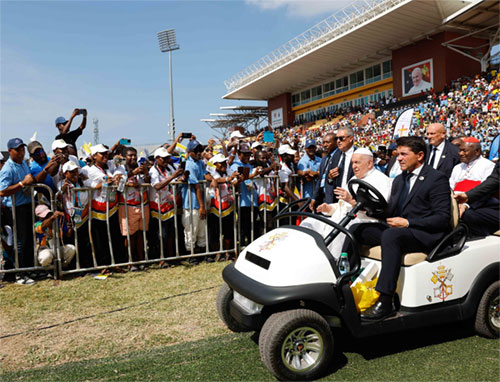Pope in Papua New Guinea: No to fear, yes to God and each other

Bishop Andrew H. Cozzens of Crookston, Minn., chairman of the board of the National Eucharistic Congress Inc., announces July 21, 2024 -- the final day of the National Eucharistic Congress at Lucas Oil Stadium in Indianapolis -- that a Eucharistic pilgrimage from Indianapolis to Los Angeles is being planned for spring 2025. Congress organizers were also considering holding an 11th National Eucharistic Congress in 2033. (OSV News photo/Bob Roller)
PORT MORESBY, Papua New Guinea (CNS) -- God calls Christians to have the courage to be open to faith and to be true neighbors to one another, Pope Francis preached in Papua New Guinea.
"Open yourselves! Open yourselves to the joy of the Gospel; open yourselves to encounter God; open yourselves to the love of your brothers and sisters," the pope said at Mass Sept. 8 in Port Moresby's Sir John Guise Stadium.
Since arriving in Papua New Guinea from Indonesia Sept. 6, Pope Francis had been hearing about the work of the government and the local church to combat clan-based violence and to assist people -- mostly women and children -- who are beaten or burned after being accused of being witches or of bringing evil to their communities.
Tribal rivalries and belief in sorcery have ancient roots in the cultures of many of Papua New Guinea's ethnic groups, but the ferocity of the attacks has worsened with the availability of modern weapons and a breakdown of traditional community leadership.
Put all that aside, Pope Francis told the people, and hear the Lord say, "Be strong, do not fear!"
The pope, who arrived earlier than scheduled at the stadium, used a small electric golf cart to ride around the track and among the people seated on the field before the Mass began. Local authorities said 35,000 people attended the Mass, sitting both inside and outside the stadium.
Traditional dancers and drummers led the procession of concelebrating bishops and priests, forming two lines for them to pass through at the foot of the altar.
While the pope recited some of the Mass prayers in halting English, he gave his homily in Italian and had an aide read an English translation. The homily focused on the day's Gospel reading, which was St. Mark's account of Jesus healing the deaf man.
The man in the story "is cut off from the world, isolated, a prisoner of his deaf and mute condition, so he cannot reach others or communicate with them," the pope said. And, like him, "we too can become cut off from communion and friendship with God and with our brothers and sisters when, instead of our ears and tongue, our hearts become blocked."
"Indeed," he said, "there is a kind of inner deafness and muteness of heart that occurs whenever we close in on ourselves or shut ourselves off from God and others through selfishness, indifference, fear of taking risks or putting ourselves on the line, resentment, hatred, and the list could go on."
But God sent Jesus "to touch our lives and remove every distance" between people and God and among people themselves, the pope said.
"Whenever we feel distant, or we choose to keep ourselves at a distance from God, from our brothers and sisters or from those who are different from us, we close ourselves off, barricading ourselves from the outside," he said. "We end up, then, revolving only around our own ego, deaf to the word of God and to the cry of our neighbor, and therefore unable to speak to God or our neighbor."
But Jesus wants to heal people, he said, conquering "our hardness of heart, helping us to overcome our fears, to open our ears and loosen our tongues; in this way, we rediscover ourselves as children loved by God and as brothers and sisters of one another."
